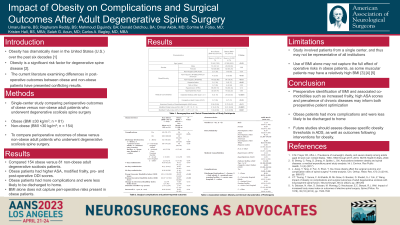Surgical Complications and Outcomes in Obese Versus Non-Obese Patients Undergoing Adult Degenerative Scoliosis Spine Surgery
Surgical Complications and Outcomes in Obese versus Non-obese Patients Undergoing Adult Degenerative Scoliosis Spine Surgery
Friday, April 21, 2023

.jpg)
Carlos A. Bagley, MD, MBA
Professor and Executive Vice Chair
UT Southwestern
Dallas, Texas, United States
ePoster Presenter(s)
Introduction: Obesity carries significant healthcare and economic burden and is associated with numerous co-morbid conditions including degenerative spine disease. Current literature examining differences in post-spine surgery outcomes affected by obesity has presented conflicting results. The goal of this study was to examine outcomes and complication rates of obese versus non-obese patients who underwent spine surgery for adult degenerative scoliosis deformities.
Methods: A retrospective case series study was conducted for 235 patients who underwent thoracolumbar adult spinal deformity (ASD) surgery (≥4 levels) at UTSW Medical Center. Patients were categorized into two cohorts based on their BMI: obese (BMI ≥30 kg/m2; n=81) and non-obese (BMI < 30 kg/m2; n=154). Demographics, clinical characteristics, peri-operative variables, and post-operative and patient-reported outcomes were analyzed. The Oswestry Disability Index (ODI), modified 5-item frailty index (mFI-5), and modified 11-item frailty index (mFI-11) questionnaires were used to analyze post-operative outcomes.
Results: African-American patients were more likely to be obese (p < 0.05, OR: 4.11) compared to Caucasian patients, who were more likely to be non-obese (p < 0.01, OR: 0.29). Intra-operatively, on average, obese patients were under anesthesia for longer time periods (p < 0.05) and had a higher estimated blood loss (p < 0.05). No significant differences were found in post-operative complication or mortality rates between the two cohorts. Obese patients had higher pre- and post-operative disability scores and were less likely to be discharged directly to home compared to non-obese patients (p < 0.05).
Conclusion : Obese patients undergoing spine surgery for degenerative scoliosis have increased surgical risk with respect to longer operative time, increased blood loss, and worse post-operative functional and disability status compared to non-obese patients. Obesity is a factor to be considered during pre-operative assessment in patients undergoing spine surgery. Future studies including multi-institutional reviews and examining the effect of pre-operative interventions targeting obesity on complications in degenerative scoliosis surgery will be needed.
Methods: A retrospective case series study was conducted for 235 patients who underwent thoracolumbar adult spinal deformity (ASD) surgery (≥4 levels) at UTSW Medical Center. Patients were categorized into two cohorts based on their BMI: obese (BMI ≥30 kg/m2; n=81) and non-obese (BMI < 30 kg/m2; n=154). Demographics, clinical characteristics, peri-operative variables, and post-operative and patient-reported outcomes were analyzed. The Oswestry Disability Index (ODI), modified 5-item frailty index (mFI-5), and modified 11-item frailty index (mFI-11) questionnaires were used to analyze post-operative outcomes.
Results: African-American patients were more likely to be obese (p < 0.05, OR: 4.11) compared to Caucasian patients, who were more likely to be non-obese (p < 0.01, OR: 0.29). Intra-operatively, on average, obese patients were under anesthesia for longer time periods (p < 0.05) and had a higher estimated blood loss (p < 0.05). No significant differences were found in post-operative complication or mortality rates between the two cohorts. Obese patients had higher pre- and post-operative disability scores and were less likely to be discharged directly to home compared to non-obese patients (p < 0.05).
Conclusion : Obese patients undergoing spine surgery for degenerative scoliosis have increased surgical risk with respect to longer operative time, increased blood loss, and worse post-operative functional and disability status compared to non-obese patients. Obesity is a factor to be considered during pre-operative assessment in patients undergoing spine surgery. Future studies including multi-institutional reviews and examining the effect of pre-operative interventions targeting obesity on complications in degenerative scoliosis surgery will be needed.
